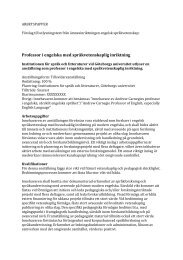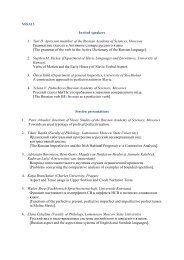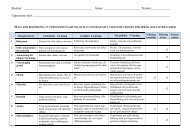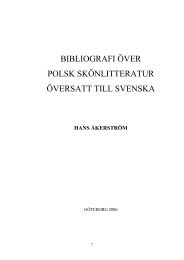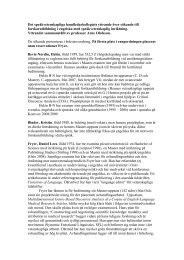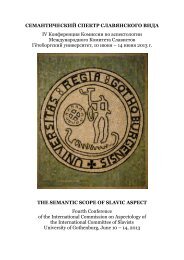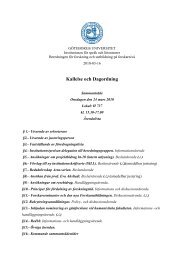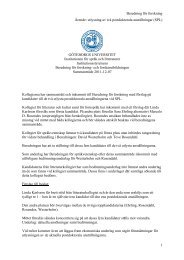agenda of Herder, which was to fight for obtaining cultural capital for Germans to challenge theFrench hegemony in literature and culture in 18 th century Europe, where French was conceivedas the most beautiful, cultivated, intellectual, international and prestigious language in literature,and also in politics, in Europe. One may say that Herder’s objective was both national and international;international because he fought for the hegemony of German as the literary languagein the European cultural scene, no less worthy of French, and national, because to attain the goal,he stressed the characteristics of the soul of German people, mirrored in German language andculture. 3Herder’s texts should be read as a historical text of his time. He is contemporary of Goethe(1749-1832) and Mme de Staël (1766-1817), and about thirty years senior of Jean-Jacques Rousseau(1712-1778). Linnaeus’ (1707-1778) is contemporary of Rousseau, and his notes on primitiveraces would never pass unremarked today. Herder’s ideas bear humanistic vein, humanisticin the sense that people, regardless of national and political hierarchy, have an equal right toculture. People are the bearer of the national soul and culture. Herder’s texts show curiosity forthe other (various folks and their culture), which also is consonant with the time of explorationstill going on in the late 18 th century in Europe. 4 Herder’s reflection on exotic folks like Arabs andAmerican Indians, and distant regions like China, Japan, Korea and India, and their culture, foretellsfuture anthropologists’ treaties. 5 After the end of World War II and in the process of decolonization,Herder’s idea that each national language embodies national identity with pride hadbearing in Africa, South-Asia and elsewhere. 6Herder’s conception of culture may be time bound to the time of national competition in the18 th century Europe, but it seems nevertheless not have lost its magnetic power today, 7 as a rediscussedby among others Casanova and Welsch. Welsch, Wolfgang. “Transkulturalität. Zur verändertenVerfasstheit heutiger Kulturen” (“Transculturality - the Puzzling Form of Cultures Today”) in Schneider,Irmela & Thomsen, Christian W (Hg.). 1997. Hybridkultur: Medien – Netze – Künstte. Köln. “Transculturality- the Puzzling Form of Cultures Today” in Spaces of Culture: City, Nation, World, ed. by Mike Featherstoneand Scott Lash, London: Sage 1999, 194-213. The article can be found http//www2.unijena.de/welsch.Casanova, Pascale. The World Republic of Litters. Translated by DeBevoise, M.B. Cambridge, Massachusetts,London: Havard U.P. 2004, 75-81. She called the historical significance of Herder ‘the Herder effect’.3 Casanova, ibid.4 Along with missionaries, who were the early sources of knowledge of distant continents and people,travelers and scientists carried out in the late 18 th century expeditions to distant places; James Cook(1728-1779) explored the region of Pacific Ocean, and Alexander von Humboldt (1799-1804) America.Carl Peter Thunberg (1743-1828), an apostle of Carl Linnaeus, is another example. He came to Japan 1775and stayed until 1776. He left Flora Japonica, 1784, and also his general observation of Japan in Resa utiEuropa, Africa, Asia, förrättad åren 1770-1779, Upsala : Joh. Edman, 1793. The first English translationcame out 1795, Travels in Europe, Africa, and Asia, made between the years 1770 and 1779, in four volumes.Vol. IV, which contains Travels in the empire of Japan, and in the islands of Java and Ceylon, together with thevoyage home came out from London: Printed for F. and C. Rivington 1795.5 Heder’s interpretation was not based on empirical observations, thus offering a telling example of amethod in which suppositions predetermine the outcome. However, including the whole aspect of life inthe notion of culture, he foretells the future discipline anthropology.6 Casanova, ibid., 79-80.7 A symposium “Herder, nationen och det musikaliska kulturarvet” (Herder, nation and national culturalheritage) was held 24 - 25 February 2006 in Sweden, organized by Centrum för folkmusik- och jazzforskning(Research Center of Folk music and Jazz). At the occasion, ‘folk’ and ‘folk music’ among others werediscussed referring to Herder.Literature and Transculturality3
cent seminar about Herder’s Folkslied in Sweden shows. At the seminar, a Swedish researcherappreciated his writing on Folkslied, saying that, by focusing on the tradition of folksong, Herder’stext helped making the suppressed class of ordinary people (Folk) visible. 8The term culture is today ‘naturalized’ and used in everyday discourse, Masuzawa points out. 9But it has been endowed with a special significance in the formation of the knowledge of modernity,and it is “one of the most important reality-constituting terms” (Miyasawa 70) Wheneverit is used, she continues, the term tends to be value charged and ‘overtly argumentative’ (71)Europe defining itself as modern since the 18 th century, constructed the other as a mirroring antipode.Hence dichotomies like modernity/tradition, civilized/primitive and own/the other cameto constitute the core of the ideology of modernity. These terms cannot liberate themselves fromimperialist and colonial heritage as shown in postcolonial and cultural studies. 10The reason of the upswing of the term transculturality is, argues Epstein, the crisis of theconcept of “multiculturalism” 11 Multiculturalism stems from U.S. concern on migration and hasspread rapidly to other countries. It expanded to the study of marginalized groups and raised thequestion of the content of education, canonization and marginalization in history and culturalpractice. A dictionary account reads,As a descriptive term, multiculturalism refers to the coexistence of people with many culturalidentities in a common state, society, or community. As a prescriptive term, it is associated withthe belief that racial, ethnic, and other groups should maintain their distinctive cultures withinsociety yet live together with mutual tolerance and respect. 12Culture is, here, regarded as identity marker for a certain group of ‘racial, ethnic, and othergroups’. The origin of the term multicultural and how it has been used as instrumental in politicaland cultural discourses make the term value laden and polemical. It has ensued the notions ofassimilation, rejection and exclusion, and also hybridity. Hybridity in this context implies powerrelationship of dominant and dominated cultures, and is value laden: hybridity is contrastedagainst authenticity and that which is legitimate. Multiculturalism can urge for ‘understanding’of the other. However, power relationship imbedded in the notion of the other has an abusive effecton performing a really egalitarian act of understanding. Multicultural view has been confrontational,and in real politics, the root of many serious conflicts in the world. For this reason, theintroduction of the term transculturality seems necessary to give a name to an egalitarian viewof culture, and to interpret actual cultural performance today.Why transculturality?Before discussing transculturality and subject position, I would like to make just a short remarkabout the term. As Welsch and Appadurai, too, pointed out, the phenomena of transferor move of people and cultural artifacts or ideas is by no means exclusively contemporary phe-48 See note 5.9 Masuzawa, Tomoko. 1998. “Culture” in Critical Terms for Religious Studies. Ed. by Taylor, Mark C. Chicago& London: University of Chicago Press.10 See Masuzawa 1998, 78. The article gives a useful survey of the genealogy of the term culture.11 Epstein, Mikhail. “Transculture”. http://glossary.isud.org/2007/11/tranculture.htlm (2010-07-11).12 Quotation from the account under “multiculturality” in Dictionary of the Social Sciences, 2002, ed. byCraig Calhoun, Oxford University Press.Noriko Takei-Thunman
- Page 1: Cultural TranslationsProceedings of
- Page 4 and 5: PrefaceThe idea of organizing a wor
- Page 6 and 7: ContentsAcknowledgementIIPrefaceIII
- Page 8 and 9: Literature and Transculturality:Som
- Page 12 and 13: nomenon. However, until long into t
- Page 14 and 15: Tawada’s work appeared in Swedish
- Page 16 and 17: multiple interpretations. Japan is
- Page 18 and 19: Cultural Translation between Tradit
- Page 20 and 21: George P. Murdock illustrated the p
- Page 22 and 23: ancestor of the Maori arrived in Ao
- Page 24 and 25: nal names do not necessarily have.
- Page 26 and 27: One of the functions of ‘cultural
- Page 28 and 29: PRELUDEIn 2003, an original artisti
- Page 30 and 31: planted, adopted and fused with ind
- Page 32 and 33: liest known written clues regarding
- Page 34 and 35: since there are many Asians and Pac
- Page 36 and 37: listening to and evaluating sounds
- Page 38 and 39: Ensemble, and the Moscow Pan-Asian
- Page 40 and 41: temporary Finnish folk music. 29I a
- Page 42 and 43: Although some space for improvisati
- Page 44 and 45: whom have devoted many years to ser
- Page 46: POSTLUDEBy way of conclusion, allow
- Page 49 and 50: IntroductionThe aim of this paper i
- Page 51 and 52: to discuss what role Japan was to p
- Page 53 and 54: I may be allowed henceforth to use
- Page 55 and 56: program was to promote and help stu
- Page 57 and 58: 50different of that of Millán -Ast
- Page 59 and 60: most impracticable people in the ea
- Page 61 and 62:
intending to give the Book a quasi
- Page 63 and 64:
understood by the West on a time wh
- Page 65 and 66:
FUJIWARA Masahiko. (2008) Kokka no
- Page 67:
- (2002) Cultural light, political
- Page 70 and 71:
Translation, or better, linguistic
- Page 72 and 73:
one may not expect anything other t
- Page 74 and 75:
as Murakami opts for a globalized v
- Page 76 and 77:
market. 17 Another indispensable to
- Page 78 and 79:
(This is part of my doctoral thesis
- Page 80 and 81:
elieve advances man’s progress he
- Page 82 and 83:
ender the New Testament into Japane
- Page 84 and 85:
a synonym for kami. The latter is a
- Page 86 and 87:
The American school text is in the
- Page 88 and 89:
Willson Reader 46 T73 47I will not
- Page 90 and 91:
Gentlzer, Edwin & Tymoczko, Maria 2
- Page 92 and 93:
Tea ceremony or tea cult?Translatin
- Page 94 and 95:
Company (VOC), men came from differ
- Page 96 and 97:
H. Stolpe gathered items in Japan f
- Page 98 and 99:
simple presentations had negative i
- Page 100 and 101:
theticism, with its manifold bearin
- Page 102 and 103:
Kumakura, Isao (1980) 近 代 茶
- Page 104 and 105:
1. Introduction and aim of the pape
- Page 106 and 107:
main character and the caller doesn
- Page 108 and 109:
not” and ”at present” that ha
- Page 110 and 111:
match this name, a sea as artificia
- Page 112 and 113:
I John Gabriel BorkmanHenrik Ibsen
- Page 114 and 115:
his dream during the 1870s, when ca
- Page 116 and 117:
make a decision. But it turns out t
- Page 118 and 119:
Ôgai’s change of translation str
- Page 120 and 121:
Behind every utterance lies two mot
- Page 122 and 123:
a large group of persons be gathere
- Page 124 and 125:
The “Territory of Translation”
- Page 126 and 127:
八 十 日 間 世 界 一 周 :
- Page 128 and 129:
heuristic tools, especially conside
- Page 130 and 131:
Left: Photo of Kawashima Chūnosuke
- Page 132 and 133:
Burlington Gardens is in London (Ro
- Page 134 and 135:
門 アリ 入 リテ 見 レバ
- Page 136 and 137:
scene seems to be merely one of man
- Page 138 and 139:
Niwa Jun’ichirō’s Spring Tale
- Page 140 and 141:
The text is full of detailed descri
- Page 142 and 143:
where the narrative voice does not
- Page 144 and 145:
The reason the “territory of tran
- Page 146 and 147:
Translating the Trip Around the Wor
- Page 148 and 149:
ForwordI have been working on my do
- Page 150 and 151:
clining though. By the end of 1980
- Page 152 and 153:
幸 い 神 の 怒 りは 鎮 ま
- Page 154 and 155:
The Public Sphere as Deliberation o
- Page 156 and 157:
and absence of hierarchy would have
- Page 158 and 159:
was used much like we would use “
- Page 160 and 161:
outcasts and bandits - were suppose
- Page 162 and 163:
cal sense, the arena where particip
- Page 164 and 165:
society” and in which “there wa
- Page 166 and 167:
sic formulations, the public sphere
- Page 168 and 169:
はじめに日 本 統 治 下 の
- Page 170 and 171:
似 地 一 下 一 下 拽 那 鼻
- Page 172 and 173:
ということから、 古 丁
- Page 174 and 175:
の「 序 」で、 大 東 亜
- Page 176 and 177:
3.1 翻 訳 と 満 洲 国 語 政
- Page 178 and 179:
取 り 入 れを 主 張 する
- Page 180 and 181:
文 化 の 翻 訳 としての「
- Page 182 and 183:
史 性 にも 留 意 すべきだ
- Page 184 and 185:
て、 渦 巻 きよりほかは
- Page 186 and 187:
変 わらないということも
- Page 188 and 189:
訳 語 と 新 語 から 見 る
- Page 190 and 191:
しは「 無 為 」や「 本 性
- Page 192 and 193:
思 想 を 基 礎 として、
- Page 194 and 195:
って「 物 理 上 哲 学 」
- Page 196 and 197:
し、まさにはこの 時 期
- Page 198 and 199:
意 譯 : 理 學 、 性傅 汛
- Page 200 and 201:
柴 田 昌『 增 補 訂 正 英
- Page 202 and 203:
一 八 七 七 年 、 文 部 省
- Page 204 and 205:
日 中 友 好 の 象 徴 「 鑑
- Page 206 and 207:
と 指 摘 した。成 吉 思
- Page 208 and 209:
をあげている。さらにま
- Page 210 and 211:
に 請 ひて 出 家 を 求 む
- Page 212 and 213:
この 時 奉 請 の 十 師 等
- Page 214 and 215:
歴 史 小 説 『 天 平 の 甍
- Page 216 and 217:
点 」が 生 じたと 指 摘
- Page 218 and 219:
まず、 昨 今 、 活 発 に
- Page 220 and 221:
2、 従 来 の 比 較 文 学 (c
- Page 222 and 223:
普 遍 理 論 を 適 用 し、
- Page 224 and 225:
ス・テグネル(Esaias Tegnér,
- Page 226 and 227:
に 満 ちる「 生 命 」に
- Page 228 and 229:
う 形 をとって 展 開 した
- Page 230:
学 が 大 学 で 展 開 して



